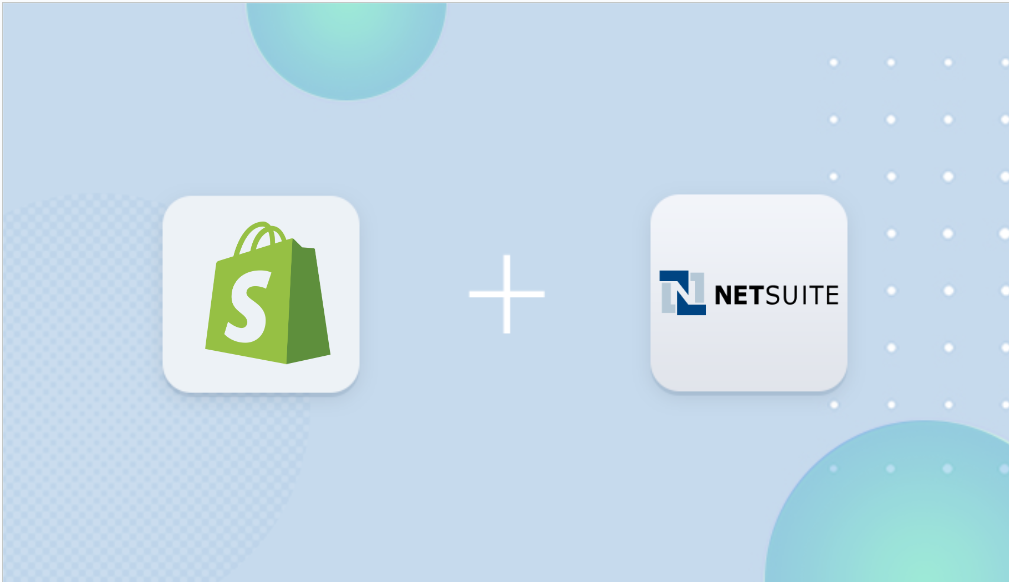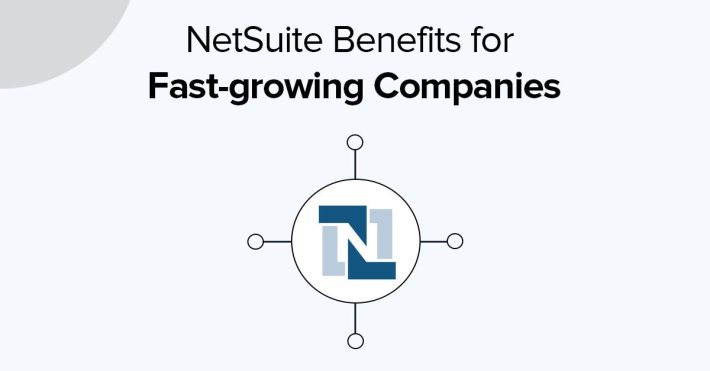Benefits of Shopify NetSuite Integration – The Ultimate Guide

Efficiently managing an eCommerce business involves more than just a great storefront—it requires precise coordination across sales, inventory, and financial operations. Disjointed systems and manual processes create many company bottlenecks, delays, and costly errors.
This is where Shopify NetSuite integration becomes invaluable. By connecting your Shopify store with NetSuite, you’re not just automating data transfer—you’re creating a streamlined system where orders sync in real-time, inventory updates are instant, and financial data stays accurate without manual intervention.
Imagine reducing order processing time by half, minimizing inventory stockouts, and gaining actionable insights into your revenue streams—all with fewer resources. For businesses aiming to scale efficiently while maintaining exceptional customer experiences, Shopify NetSuite integration isn’t just an option—it’s a strategic necessity.
In this guide, we’ll break down the real-world benefits of this integration and how it can transform your operations for sustainable growth.
Why Integrate NetSuite and Shopify?
In our increasingly digital landscape, a surge in online shopping and e-commerce businesses has redefined the e-commerce business ecosystem.
According to Forbes, US e-commerce sales are projected to reach over $1.1 trillion in sales in 2023. Given this trend, businesses must optimize backend operations to meet the front-end demand.
For enterprises leveraging NetSuite as an ERP system and Shopify for e-commerce, integration isn’t just a luxury—it’s a necessity. Without it, they face fragmented data landscapes, inefficient manual data transfers, and operational silos that can hinder growth and profitability.
Metrics Impacted without Netsuite-Shopify Integration:
- Order Processing Time: Without integration, there’s a longer lead time from order placement to fulfillment.
- Data Accuracy: Manual data transfer increases the risk of discrepancies.
- Operational Costs: Increased manpower and time in handling data between systems.
- Inventory Management: Difficulty in tracking real-time stock levels, leading to overstocks or stockouts.
- Customer Satisfaction: Delays in order updates or shipping can affect the customer experience.
Features and Benefits of Shopify NetSuite Integration
1. Enhanced Order Management and Fulfillment
Automated Order Processing: Synchronizes order data across platforms, reducing manual entry and errors.
Real-Time Inventory Updates: Ensures orders are fulfilled on time by keeping the inventory tracking data current.
Improved Customer Satisfaction: Faster and more accurate fulfillment enhances customer behavior and overall shopping experience.
2. Streamlined Inventory Management
Centralized Inventory: Integrates inventory data between the Shopify online store, and NetSuite, reducing stock discrepancies.
Automated Updates: Inventory levels are adjusted in real-time across platforms, minimizing stockouts and overstocking.
Efficient Tracking: Leverages NetSuite’s advanced tracking capabilities to optimize stock levels and to streamline operations and warehouse management.
3. Improved Business Operations
Unified Workflow: Automates financial processes that can streamline business processes further, improving operational efficiency by eliminating manual data entry.
Customer Relationship Management: Unifies customer data and customer relationships together, improving engagement and support with real-time insights.
Scalable for Growth: As businesses grow, the integration scales seamlessly to manage increased transaction volumes and data.
4. Seamless Data Synchronization
Real-Time Data Sync: Synchronizes key business data, such as orders, inventory, and other customer information and details, ensuring data accuracy.
Error Reduction: Eliminates manual data entry and ensures consistent and enhanced customer experience through data synchronization across systems.
Operational Visibility: Provides businesses with real-time financial management and access to key performance indicators like sales, inventory levels, and customer data.
5. Customization for Specific Business Needs
The Shopify-NetSuite integration empowers businesses to streamline operations with tailored workflows and data mapping, ensuring processes align perfectly with unique needs. Its flexibility supports evolving requirements, enabling seamless adjustments as companies grow. With real-time data synchronization, teams gain instant access to accurate information, fostering collaboration and informed decision-making. By automating order processing and inventory management, the integration frees up time for E-commerce teams to focus on scaling and improving customer experiences. Additionally, NetSuite aggregates data from Shopify and other platforms, providing a comprehensive view of customer interactions to drive actionable insights and business growth.
Steps to Integrate Shopify with NetSuite
1. Assess Integration Requirements
Business Goals: Define what you want to achieve with the integration, such as improving order accuracy or automating inventory updates.
Data Scope: Identify which data will be synchronized between Shopify and NetSuite.
Technical Needs: Understand API and authentication requirements to ensure a smooth connection.
2. Configure Shopify and NetSuite Accounts
Account Setup: Ensure both Shopify and NetSuite accounts are correctly configured.
API Setup: Establish secure connections through APIs to enable data flow between platforms.
Data Mapping: Map out how data will move between systems, ensuring consistency in fields and formats.
3. Connect Shopify to NetSuite
Integration Options: Use a pre-built integration solution or custom integration tailored to specific workflows.
Testing and Monitoring: Test the integration to ensure data syncs smoothly. Monitor for any issues during the initial run.
Post-Launch: Regularly check data flow, performance, and resolve errors as necessary.
Choosing the Right Integration Partner
- Industry Knowledge: Choose a partner with proven experience integrating Shopify and NetSuite.
- Customization Capabilities: Ensure the partner can adapt the integration to your unique business needs.
- Support and Maintenance: Evaluate the partner’s post-integration support for ongoing updates and troubleshooting.
Overcoming Integration Challenges
1. Common Obstacles and Solutions
Data Mapping Conflicts: Ensure accurate field mapping to avoid data inconsistency issues.
System Downtime: Implement solutions that allow seamless integration and automated processes with minimal disruption to business operations.
Error Handling: Build error-reporting mechanisms to catch and resolve data synchronization issues quickly.
2. Best Practices
- Comprehensive Testing: Perform thorough testing across various scenarios to ensure optimal integration performance and identify potential issues early.
- Real-Time Monitoring: Monitor to track integration health and proactively address errors before escalating.
- Stakeholder Involvement: Engage critical stakeholders during testing to gather valuable feedback and refine integration usability for business needs.
- Specific Configurations: Customize NetSuite settings for order management and ensure customer records are correctly synced with Shopify.
- Error Monitoring and Log Reviews: Monitor for errors during testing and review integration logs to efficiently detect and resolve data flow discrepancies.
Conclusion
- Shopify NetSuite integration offers multiple benefits, such as automated order management, real-time inventory updates, and streamlined business operations.
- Seamless data synchronization and customizable integration are vital features that empower businesses to optimize e-commerce workflows.
- By choosing the right integration partner and following best practices, businesses can overcome challenges and maximize the value of the integration.
FAQs
What is the difference between Shopify and NetSuite?
Shopify is your online storefront—customers browse and buy your products. NetSuite is your back-end powerhouse, handling inventory, orders, and finances. While the Shopify platform focuses on sales and customer experience, NetSuite manages the operations that keep your business running smoothly. Integrating them means your sales and operations work together seamlessly.
What are the benefits of Shopify integration?
Shopify integrations with systems like NetSuite offer several perks:
Automated Data Sync: Orders, customer info, and inventory levels update automatically between platforms, saving time and reducing errors.
Real-Time Inventory Management: Keep stock levels accurate to prevent overselling or running out of popular items.
Streamlined Order Processing: Faster fulfillment as orders flow directly into your back-end system.
Improved Financial Accuracy: Sales data syncs with accounting, making financial reporting a breeze.
Better Customer Experience: Quick processing and accurate information lead to happier customers.
Scalability: Easily handle more orders as your business grows without extra hassle.
Why integrate NetSuite?
NetSuite integration helps unify your business processes:
Data Accuracy: Eliminates manual data entry, reducing errors.
Operational Efficiency: Automates routine tasks so your team can focus on growth.
Real-Time Insights: Get up-to-date info on sales, inventory, and finances for better decision-making.
Customer Insights: A complete view of your customers helps tailor experiences and marketing efforts.
Scalability: Supports your business as it expands, handling more volume effortlessly.
What are the security measures in place during Shopify NetSuite integration?
Security is a top priority:
Data Encryption: Information transferred between Shopify and NetSuite is encrypted.
Secure APIs: Use authentication keys and tokens to ensure authorized access only.
Access Controls: Role-based permissions limit who can view or edit data.
Compliance Standards: Adheres to regulations like GDPR and PCI DSS.
Regular Updates: Ongoing security patches protect against new threats.
Can the Shopify NetSuite integration be tailored for my specific e-commerce needs?
Absolutely! The integration can be customized to fit your business:
Custom Workflows: Set up how data moves based on your processes.
Data Mapping: Ensure the right information syncs between systems.
Add-On Features: Include additional tools like advanced reporting or multi-currency support.
Scalability: Adjust the integration as your needs evolve.
How scalable is Shopify NetSuite integration as my business grows?
It’s designed to grow with you:
Handles Increased Volume: Manage more orders without slowing down.
Supports Multiple Channels: Integrate additional stores or platforms easily.
Future-Proof: Regular updates keep the system current with new features.
Efficiency: Maintain smooth operations without needing more staff.
